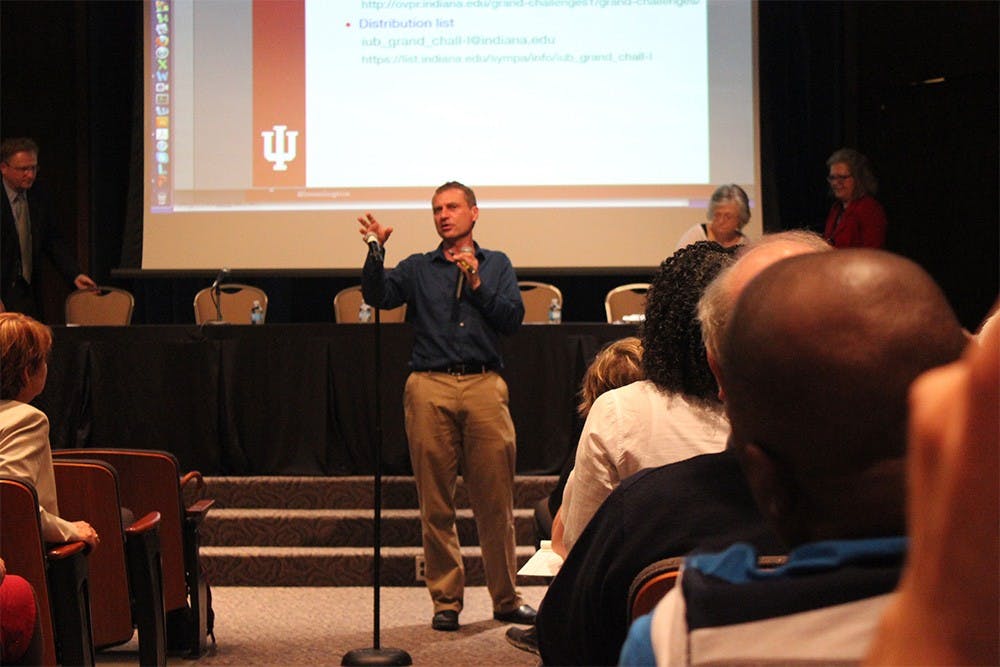Rumbles of speech filled the Whittenberger Auditorium as IU faculty greeted each other like old friends.
On their laps are laptops, iPads and pens and paper to take notes with and bring up discussion points for IU’s Grand Challenges plan.
On Monday, Acting Provost John Applegate hosted a town hall meeting to brainstorm ideas for what Grand Challenges IU will take on. Grand Challenges, according to the White House’s Office of Science and Technology, are ambitious but achievable goals that have the potential to capture the public’s imagination and harness science, technology and innovation to solve important national or global problems.
In 2013, President Obama urged universities to take on grand challenges, and in President Michael McRobbie’s Bicentennial Strategic Plan, IU promises to answer the call. This town hall meeting was the beginning of IU’s selection of five grand challenges to strive for during the next five years and beyond.
“Take the grand in Grand Challenges very literally,” Applegate said.
Interim Vice Provost for Research Rick Van Kooten led the event and spent the first hour giving information about how the application process for a Grand Challenge idea will work.
To submit a Grand Challenge idea, faculty must file an application and prepare a concept paper that lays out the theme idea and how it will involve campus and community partnerships and leverage IU funds, Van Kooten said. An exact day isn’t set yet, but papers will be due sometime in the fall.
“Some of these things will change when the new Vice President for Research is found, but we want this to be a bottom-up faculty-driven initiative,” Van Kooten said. “Papers are due this fall, so you have time to think and to prepare a good concept paper.”
After he spoke about the logistics, Jennifer Lawrence, the executive director for IU Foundation Relations, talked about how to find funding. She mapped out donations in the United States, which showed 72 percent of all donations come from individuals, 15 percent come from foundations and 5 percent from corporations.
She also gave the statistic that even though most funding goes to religion at 31 percent of all charitable donations in the U.S., education comes in second place with 16 percent of all U.S. givings.
“We can help because we are in touch with the officers that meet with those individuals,” Lawrence said. “So if there are ideas that are not going to gain traction with corporations or foundations, we have the ability to pass that information along and make connections with individual donors.”
Next, the President and CEO of IU Research and Technology Corporation Tony Armstrong spoke about how to engage economically on a regional, national and global scale.
“How do we take what is this vast intellectual resource that is IU and how do we bring that to bear on Hoosiers, our nation and really all around the world?” Armstrong said. “What we’ve tried to do is take what we’re doing in the University and see where there’s a use for it out in the world.”
After he spoke, resources were given to help faculty write proposals and find faculty to collaborate with at other universities.
Then an open microphone session began for faculty to propose and share ideas.
So many faculty ?members wanted to speak that each member was allotted only three minutes to pitch their idea. The hope was for faculty to hear a challenge idea they wanted to be a part of or to get ideas more refined.
Projects proposed included finding new ways to harness energy and matter, creating charter schools overseas for inner city and urban youth to attend, fighting climate change and health equity.
Faculty member Debby Herbenick of the School of Public Health feared her challenge might not be taken seriously.
“The grand challenge I’m proposing is one I’ve been told in the past is too grand,” Herbenick said. “In the past we’ve talked about the possibility of ending sexual violence on campus. If that is too grand, then I suggest cutting it by a third or in half.”






